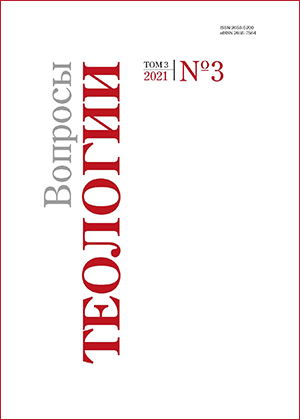Специфика раннехристианских представлений о Божественном Промысле в контексте античной философии (с I по III век)
DOI:
https://doi.org/10.21638/spbu28.2021.302Аннотация
В статье обозначаются ключевые особенности христианского понимания Промысла в сравнении с философскими течениями Античности с I по III в. (до неоплатонизма). Автор выделяет три парадигмы понимания Божественного Промысла в античной языческой философии указанного периода — атеистическую, пантеистическую и деистическую — и в этом контексте определяет христианскую парадигму как диалогический панентеизм. По мнению автора, христианство в самой своей основе предлагает нехарактерное для язычества мировоззрение, согласно которому космос сосредоточен на осуществлении диалога человека с Богом и достижении экзистенциальной близости Творца и творения. Также отмечается, что христианство, в отличие от античной мысли, ставит акцент на том, что фундаментальным свойством высшего Божества является Его разомкнутость по отношению к Иному, а не просто самосозерцающее или самодовлеющее спокойствие. Это, в свою очередь, определяет два других аспекта в христианском учении о Промысле: всепронизывающее участие Бога в жизни мира и Его попечение об индивидуальном и несовершенном. Также указывается на то, что православное понимание Промысла представляет собой гармоническую середину между крайностями пантеизма и деизма.
Ключевые слова:
Промысл, средний платонизм, эпикуреизм, аристотелизм, стоицизм, судьба, личность
Скачивания
Библиографические ссылки
Athenagoras (1864) “Embassy for the Christians”, in Pamiatniki drevnei khristianskoi pis’mennosti v russkom perevode. Vol. 5, p. 11–66. Moscow, Katkov i Ko Publ. (In Russian)
Baltzly D. (2010) “Is Plato’s Timaeus panentheistic?”, in Sophia, iss. 49, pp. 193–215.
Benevich G. I. (2012–2013) “About some features of the understanding ‘providence’ and ‘fate’ in the Christian thought of the late antiquity», in Hyperboreus, iss. 18, pp. 152–176. (In Russian)
Benevich G. I. (2013) A short history of the “providence” from Plato to Maximus the Confessor. St. Petersburg, Izdatel’stvo Russkoi khristianskoi gumanitarnoi akademii Publ. (In Russian)
Borodai T. Yu. (2006) “The problem of evil in the pagan ancient platonism: Proclus as the critic of Plotinus”, in Problema zla i teoditsei, pp. 54–68. Moscow, Institut Filosofii RAN Publ.(In Russian)
Celsus (1990) “Logos Alethes”, in Pervoistochniki po istorii rannego khristianstva. Antichnye kritiki khristianstva, pp. 263–331. Moscow, Politizdat Publ. (In Russian)
Clement of Alexandria (2003) Stromata, transl. by E. V. Afonasin. St. Petersburg, Izdatel’stvo Olega Abyshko Publ. (In Russian)
Culp J. (2008) “Panentheism”, in Stanford Encyclopedia of Philosophy. Available at: https://plato.stanford.edu/entries/panentheism (accessed: 20.02.2021).
Dillon J. (2002) The middle platonists 80 B.C. — 220 A.D. St. Petersburg, Izdatel’stvo Olega Abyshko Publ., Aleteiia Publ. (In Russian)
Dudley J. (2017) “The Physical and Metaphysical Foundations of Ethics for Aristotle”, in Verbum, iss. 19, pp. 9–23.
Glubokovskii N. N. (1907) “St. Paul and Stoicism”, in Khristianskoe chtenie, iss. 11, pp. 513–533. (In Russian)
Gregersen N. H. (2004) “Three Varieties of Panentheism”, in In Whom We Live and Move and Have Our Being: Panentheistic Reflections on God’s Presence in a Scientific World, pp. 19–35. Grand Rapids, William B. Eerdmans Publ.
Irenaeus (2008) Adversus Haereses. St. Petersburg, Izdatel’stvo Olega Abyshko Publ. (In Russian)
Jerome of Stridon (1894). “Three books of interpretations on the Epistle to the Galatians”, in Works of the blessed Jerome of Stridon. In 17 vols, vol. 17, pp. 1–390. Kiev, Tipografiia I. I. Chokolova Publ. (In Russian)
Justin Martyr (1995) “Apologies”, in Sv. Iustin. Filosof i muchenik. Tvoreniia, pp. 31–124. Moscow, Palomnik, Blagovest Publ. (In Russian)
Klibengajtis T. (2007–2008) “The World as God’s Body? Some remarks about the panentheistic theological tradition exemplified by the conceptions of Maximus the Confessor”, in Studies in Science and Theology, iss. 11, pp. 113–130.
Lopukhin A. P., ed. (2009) Explanatory Bible or commentaries on all the books of the Holy Scriptures of the Old and New Testaments. In 7 vols, vol. VII. Moscow, Dar” Publ. (In Russian)
Losev A. F. (2000) The history of the ancient aesthetics. In 8 vols, vol. 1. Moscow, AST Publ. (In Russian).
Losev A. F. (2000) The history of the ancient aesthetics. In 8 vols, vol. 2. Moscow, AST Publ. (In Russian)
Losev A. F. (2000) The history of the ancient aesthetics. In 8 vols, vol. 4. Moscow, AST Publ. (In Russian)
Marcus Minucius Felix. (1999) “Octavius”, in Works of ancient Christian apologists, pp. 223–274. St. Petersburg, Aleteiia Publ. (In Russian)
Mesiats S. (2013) “Consciousness and personality in the philosophy of Plotinus”, in ΠΛΑΤΩΝΙΚΑ ΖΗΤΗΜΑΤΑ: Issledovaniia po istorii platonizma, pp. 147–169. Moscow, Krug” Publ. (In Russian)
Mezentsev I. V. (2018) “The problem of the applicability of the concept ‘consciousness’ in the interpretation of the Christian triadology”, in Svet Khristov prosveshchaet vsekh: al’manakh Sviato-Filaretovskogo pravoslavno-khristianskogo instituta, iss. 28, pp. 43–60. (In Russian)
Mileski G. (2018) “The Person in Panentheism: A Trinitarian Panentheistic Anthropology”, in Eighth International Conference on Religion and Spirituality in Society: Religion, Society, and Sociopolitical Engagement. Berkeley, CA, University of California Berkeley. Available at: https://www.academia.edu/42145578/The_Person_in_Panentheism_A_Trinitarian_Panentheistic_Anthropology (accessed: 20.02.2021).
Nesteruk A. V. (2003) Light from the East: Theology, Science, and the Eastern Orthodox Tradition. Minneapolis, Augsburg Fortress Publ.
Shaab G. L. (2007) “The creative suffering of the triune God: An evolutionary panentheistic paradigm”, in Theology and science, vol. 5, iss. 3, pp. 289–304.
Shakhnovich M. M. (2010) “Epicureanism and Christianity in the philosophical and theological discourse of the Hellenistic era”, in Gosudarstvo, religiia, tserkov’ v Rossii i za rubezhom, iss. 4, pp. 189–196. (In Russian)
Stoliarov A. A. (1995) The Stoa and the stoicism. Moscow, Kami Grup Publ. (In Russian)
Tatian the Assyrian (1863) “Oratio ad Graecos”, in Pamiatniki drevnei khristianskoi pis’mennosti v russkom perevode. Vol. 4, pp. 135–182. Moscow, Katkov i Ko Publ. (In Russian)
Tertullian (1994) “Ad Nationes”, in Tertullian. Selected works, transl. by A. A. Stoliarov, pp. 37–82. Moscow, Progress Publ. (In Russian)
Volkova N. P. (2017) Plotinus on the matter and the evil. Moscow, Akvilon Publ. (In Russian)
Ware K. (2004) “God Immanent yet Transcendent: The Divine Energies according to Saint Gregory Palamas”, in In Whom We Live and Move and Have Our Being: Panentheistic Reflections on God’s Presence in a Scientific World, pp. 157–168. Grand Rapids, William B. Eerdmans Publ.
Загрузки
Опубликован
Выпуск
Раздел
Лицензия
Статьи журнала «Вопросы теологии» находятся в открытом доступе и распространяются в соответствии с условиями Лицензионного Договора с Санкт-Петербургским государственным университетом, который бесплатно предоставляет авторам неограниченное распространение и самостоятельное архивирование.




